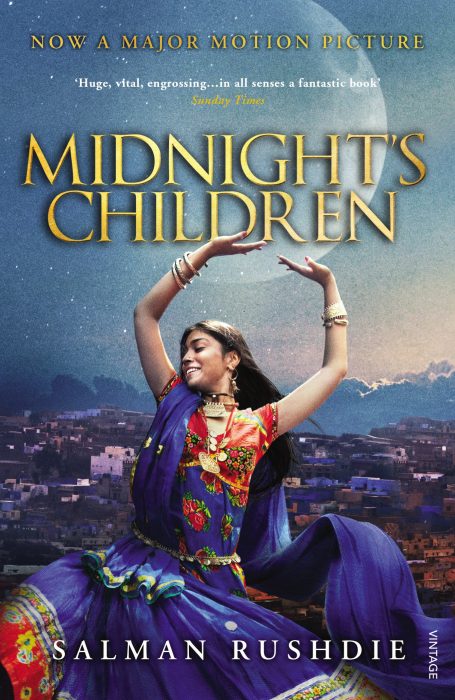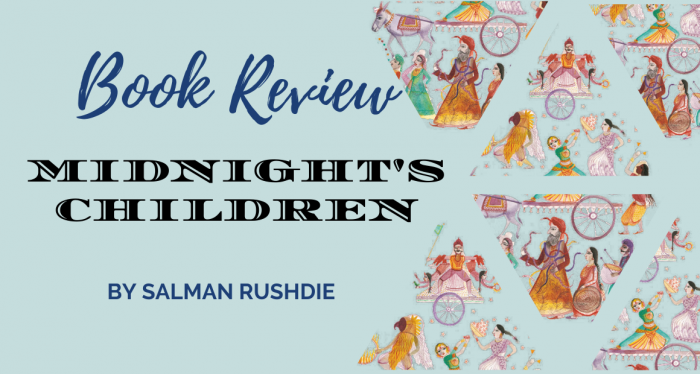Title: Midnight’s Children
Author: Salman Rushdie
Publisher: Jonathan Cape
Genre: Magical Realism, Historical Fiction
First Publication: 1981
Language: English
Major Characters: Saleem Sinai, Padma Mangroli, Aadam Aziz, Mumtaz (Amina Sinai), Shiva, Parvati-The-Witch, Padma
Setting Place: India, Pakistan, and Bangladesh
Narration: First-person narrative of Saleem Sinai
Theme:The Unreliability of Memory and Narrative, Destruction vs. Creation
Book Summary: Midnight’s Children
‘Midnight’s Children’ by the renowned author Sulman Rushdie is an epic novel that opens up with a child being born at midnight on 15th August, 1947, just at a time when India is achieving Independence from centuries of foreign British colonial rule.
Winner of Booker Prize, this book has been added in the list of Great Book of the 20th century and narrates the story of Saleem Sinai and the times he lives with the newborn nation.
Divided in three parts, the novel begins with the story of Sinai’s family and the various events that lead to India’s independence and eventually to partition. Born precisely at the midnight, Saleem was born with telepathic powers and later discovers that all the kids born in India between 12 A.M. and 1 A.M. are impregnated with the special power.
Using his telepathic powers, he assembles a conference with all kids to reflect upon the issues like culture, linguistic, religion and political differences to shape the nation. Highlighting the relation between father and son and a nation yet in its nascent stage, it is an enchanting family adventure with lots of human drama and shocking summoning.
The novel has also been adapted as a stage show by the Royal Shakespeare Company in the year 2003.
Book Review: Midnight’s Children
What an extraordinary writer Rushdie is! Midnight’s Children is a brilliant and complex novel. Told by an unreliable, at times annoying, but endlessly fascinating narrator Saleem Sinai, it is a story in which reality meets myth, in which dreams turn into facts, in which countries live tormented and tragic lives, resembling closely those of human beings that inhabit them. This chaotic narrative of a child (and later on teenager/adult) born at midnight (and not any midnight but midnight in which India was born as an independent state) is immensely powerful – and in a want of a better world – magical.
“I told you the truth,” I say yet again, “Memory’s truth, because memory has its own special kind. It selects, eliminates, alters, exaggerates, minimizes, glorifies, and vilifies also; but in the end it creates its own reality, its heterogeneous but usually coherent versions of events; and no sane human being ever trusts someone else’s version more than his own.”
While reading Midnight’s Children, I had a feeling that Rushdie was deliberately trying to make things hard for the reader. He is burning history, myth, religion- until one can’t tell them apart. He is turning language upside down- so that he could transform it into something new; and he blends sacred with everyday, depth with vulgarity- and somehow it all makes sense. Somehow it all blends together perfectly, like a well prepared dished. In the end, Rushdie present its readers with something delicious.
Salman Rushie’s style of writing took some adjusting to. I’m no stranger to magic realism, but his magic realism is truly one of a kind. Still, it would be a shame to label a novel of this complexity simply as a ‘magic realism’, for it is a truly unique and beautiful book. The way it takes history on is nothing short of courageous. Rushdie is a bold writer, cutting into the tissue of history with a earnestness of a surgeon. Unlike a surgeon, he doesn’t heal by cutting- but rather by examining. He cuts not to remove or add something, but to see- to learn more.
Midnight’s Children is a novel that deserves to be examined on its own and not just like a representative work in a genre. With its fascinating cast of character, with its unique humour that is at times so dark it is borderline sickening – this is a family saga like no other.
I have been only the humblest of jugglers-with-facts; and that, in a country where the truth is what it is instructed to be, reality quite literally ceases to exist, so that everything becomes possible except what we are told is the case.
That all being said, for me, this was not an easy read. It took me a lot of hours to read this one- but also a lot of concentration. I felt like I had to really make an effort to read each line, like the book was written in a language. English might be the language I think in (most of the time anyway), but Rushie’s (or better to say Midnight’s Children) English is a special kind of English, English of India- in the sense that it tries to capture India’s spirit, tradition and its distinct flavour.
Finally, there is a very human dimension to this book. Underneath its complexity and chaos, underneath its parallel histories, underneath its myth and magic, underneath it all- there are genuine emotions. There is a glimpse into souls of people living in India, Kashmir and Pakistan. There is a little boy afraid and isolated- questioning his identity; and there are hearts torn and hearts broken. There is a man who loves his country but isn’t afraid to re-examine (and sometimes even make fun of ) its complexities. A narrator that admits to telling lies, but who (like all good artists) tells truth with his lies.






